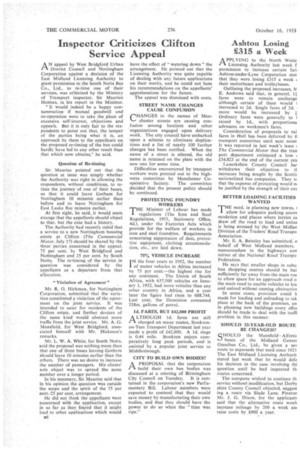Inspector Criticizes Clifton Service Appeal
Page 40

If you've noticed an error in this article please click here to report it so we can fix it.
AN appeal by West Bridgford Urban District Council and Nottingham Corporation against a decision of the East Midland Licensing Authority to grant permission to the South Notts Bus Co., Ltd., to re-time one of their services, was criticized by the Ministry of Transport inspector, Sir Maurice Holmes, in his report to the Minister.
" It would indeed be a happy consummation if mutual goodwill and co-operation were to take the place of excessive self-interest, objections and appeals. But it is only fair to the respondents to point out that, the temper of the parties being what it is, an approach by them to the appellants on the proposed re-timing of the bus could hardly have led to any other result than that which now obtains," he said.
Question of Re-timing Sir Maurice pointed out that the question at issue was simply whether the Authority was right in allowing the respondents, without conditions, to retime the journey of one of their buses, so that it could leave Gotham for Nottingham 10 minutes earlier than before and to leave Nottingham for East Leake five minutes earlier.
At first sight, he said, it would seem strange that the appellants should object to that, but the case had a history,
The Authority had recently ruled that a service to a new Nottingham housing estate at Clifton (The Commercial Motor, July 17) should be shared by the three parties concerned in the appeal, 75 per cent. by West Bridgford and Nottingham and 25 per cent. by South Notts. The re-timing of the service in question was considered by the appellants as a departure from that allocation.
• " Vioiaiion of Agreement"
Mr. R. 0. Hickman, for Nottingham Corporation, submitted that the variation constituted a violation of the agreement on the joint service. It was intended to cater for residents of the Clifton estate, and further devices of the same kind would abstract more traffic from the joint service. Mr. A. G. Mansfield, for West Bridgford, associated himself with Mr. Hickman's remarks.
Mr. L. W. A. White, for South Notts. said the proposal was nothing more than that one of three buses leaving Gotham should leave 10 minutes earlier than the others. There was no' desire to increase the number of passengers. His clients' sole object was to spread the same number over a longer period.
In his summary, Sir Maurice said that in his opinion the question was outside the scope and the spirit of the 75 per cent.-25 per cent. arrangement.
He did not think the appellants were concerned with the application, except in so far as they feared that it might lead to other applications which would a6 have the effect of " watering down" the arrangement. He pointed out that the Licensing Authority was quite capable of dealing with any future applications on their merits, and he could not base his recommendations on the appellants' apprehensions for the future.
The appeal was dismissed with costs.
STREET NAME CHANGES CAUSE CONFUSION
CHANGES in the names of Manchester streets are causing confusion among hauliers and other organizations engaged upon delivery work. The city council have embarked upon a scheme to eliminate duplications and a list of nearly 100 further changes has been notified. When the name of a street is altered, the old name is retained on the plate with the new 'one for some time.
Difficulties encountered by transport workers were pointed out to the highways committee by Manchester Cooperative Sooiety. The committee decided that the present policy should be continued, PROTECTING FOUNDRY WORKERS
THE Minister of Labour has made
regulations (The Iron and Steel Regulations, 1953, Stationery Office, 4d.), under the Factories Acts which provide for the welfare of workers in iron and steel foundries. Requirements concerning suppression of dust, protective equipment, clothing accommodation, etc., are laid down.
75% VEHICLE INCREASE
I N the four years to 1952, the number of motor vehicles in Africa increased by 75 per cent.—the highest rise for any continent. The Union of South Africa, with 637,500 vehicles on January 1, 1952, had more vehicles than any other country in Africa, and a year later the figure had risen to 688,744. Last year, the Dominion consumed 338m. gallons of petrol.
Id. FARES, BUT £42,000 PROFIT A LTHOUGH Id. fares are still
3. charged on many routes, Stocktonon-Tees Transport Department last year made a profit of £42,000. A Id. stage is 0.44 mile. Stockton enjoys comparatively long peak periods, and is assisted by a popular joint service to Middlesbrough.
CITY TO BUILD OWN BODIES? A PROPOSAL that the corporation build their own bus bodies was discussed at a meting of Birmingham City Council on Tuesday. It is contained in the corporation's new Parliamentary Bill. Labour members were expected to contend that they would save money by manufacturing their own bodies, and that they should have the power to do so when the "time was ripe."




























































































